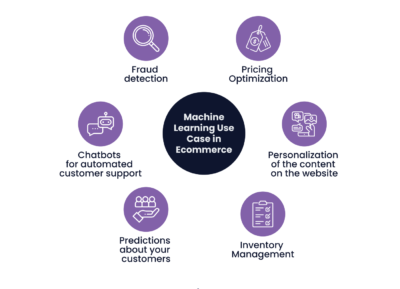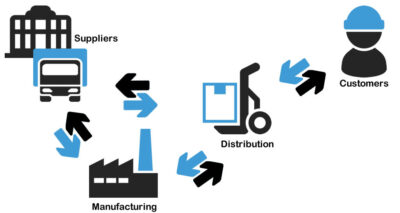Artificial intelligence (AI) is revolutionizing every sector. The use of AI in ecommerce is a rapidly growing field that is changing the way businesses interact with their customers. With the rise of online shopping, retailers are looking for ways to improve the customer experience and increase sales. AI technology is providing solutions to these challenges, allowing businesses to personalize their offerings and improve the overall shopping experience.

One of the most significant ways that AI is impacting ecommerce is through personalized recommendations. By analyzing customer data and behavior, AI algorithms can suggest products that are likely to appeal to each individual customer. This not only improves the customer experience but also increases sales by encouraging customers to purchase additional items.
Another area where AI is making a difference is in customer service. Chatbots and virtual assistants can answer customer questions and provide support 24/7, improving response times and reducing the workload on human customer service representatives. Additionally, AI-powered tools can analyze customer feedback and sentiment to identify areas for improvement and make data-driven decisions.
AI Technologies in Ecommerce
Artificial Intelligence has revolutionized the way ecommerce businesses operate. The use of AI in ecommerce businesses is to provide personalized shopping experiences, improve customer engagement, and optimize their operations. In this section, we will discuss the three main AI technologies used in ecommerce: Machine Learning, Natural Language Processing, and Computer Vision.
Machine Learning
Machine Learning (ML) is a subset of AI that enables machines to learn from data and improve their performance without being explicitly programmed. In ecommerce, ML algorithms are used to analyze customer data, such as browsing behavior, purchase history, and demographics, to predict customer preferences and provide personalized recommendations. ML algorithms can also be used to optimize pricing strategies, detect fraud, and automate inventory management.

Natural Language Processing
Natural Language Processing (NLP) is a branch of AI that enables machines to understand, interpret, and generate human language. In ecommerce, NLP is used to improve customer engagement by enabling chatbots and virtual assistants to understand and respond to customer queries in a natural language. NLP can also be used to analyze customer feedback and reviews to identify common issues and improve product descriptions and search results.
Computer Vision
Computer Vision (CV) is a field of AI that enables machines to interpret and analyze visual data from the world around them. In ecommerce, CV is used to improve product search and discovery by enabling visual search and product recommendations based on images. CV can also be used to optimize warehouse operations by enabling robots to navigate and identify products.
1. Personalization and Customer Experience
The most significant impact of AI on ecommerce is how owners of such businesses interact with their customers. The use of AI in ecommerce businesses can offer personalized experiences that cater to their customers’ unique needs. Here are some ways in which AI is transforming personalization and customer experience in ecommerce.

Product Recommendations
AI-powered product recommendations have become a staple in ecommerce. By analyzing customer data, AI algorithms can suggest products that customers are more likely to purchase. These recommendations can be based on a customer’s browsing history, purchase history, or even their social media activity. This personalized approach can lead to increased sales and customer loyalty.
Customer Service Chatbots
AI-powered chatbots are changing the way ecommerce businesses handle customer service. Chatbots can provide 24/7 support and answer customer queries in real time. By leveraging natural language processing (NLP), chatbots can understand and respond to customers’ questions and concerns. This not only improves customer satisfaction but also reduces the workload on customer service teams.
Predictive Search
AI-powered predictive search can help ecommerce businesses improve their search functionality. By analyzing customer data, AI algorithms can predict what customers are searching for and suggest relevant products. This can lead to faster and more accurate search results, improving the overall customer experience.
2. Inventory and Supply Chain Management
Managing inventory and supply chain is a crucial aspect of any ecommerce business. The impact of AI on ecommerce has revolutionized the way businesses manage their inventory and supply chain. AI-powered tools can help businesses forecast demand, automate warehouses, and optimize logistics to improve efficiency and reduce costs.

Demand Forecasting
The use of AI in ecommerce inventory and supply chain management enables demand forecasting tools to help businesses predict future demand accurately. These tools use historical sales data, market trends, and other relevant data to forecast demand. With accurate demand forecasting, businesses can optimize their inventory levels, reduce stockouts, and avoid overstocking.
Warehouse Automation
The use of AI in e-commerce is also through warehouse automation tools that help businesses automate their warehouse operations. These tools can automate tasks such as picking, packing, and shipping, reducing the need for human intervention. This can help businesses reduce errors, increase efficiency, and improve customer satisfaction.
Logistics Optimization
AI-powered logistics optimization tools allow businesses to optimize their supply chain. These tools can help businesses choose the best shipping routes, carriers, and modes of transportation. This can help businesses reduce transportation costs, improve delivery times, and enhance customer satisfaction.
Overall, the impact of AI on ecommerce businesses is the management of their inventory and supply chain more efficiently. With accurate demand forecasting, warehouse automation, and logistics optimization, businesses can reduce costs, improve efficiency, and enhance customer satisfaction.
3. AI-Driven Marketing and Sales
Improved marketing and sales present another impact of AI on ecommerce businesses. By leveraging AI technology, businesses can gain valuable insights into customer behavior, optimize ad targeting, and dynamically adjust pricing to maximize profits.

Data-Driven Insights
AI algorithms can analyze vast amounts of customer data to identify patterns and trends that would be difficult for humans to detect. By using machine learning models, businesses can gain insights into customer preferences and behavior, allowing them to tailor their marketing and sales strategies accordingly.
For example, AI can help businesses identify which products are most likely to sell based on customer search and purchase history. This information can be used to optimize product placement, pricing, and promotions to maximize sales.
Ad Targeting
The use of AI in ecommerce ad targeting can help businesses reach the right customers with the right message at the right time. By analyzing customer data, AI algorithms can identify which customers are most likely to be interested in a particular product or service and serve them relevant ads.
AI can also help businesses optimize ad placement and bidding strategies to maximize ROI. By automatically adjusting bids based on real-time data, businesses can ensure that their ads are shown to the right customers at the right price.
Dynamic Pricing
Using AI in ecommerce to analyze real-time data on customer behavior and market trends to dynamically adjust pricing also has a significant impact on business outcomes. By using machine learning models, businesses can optimize pricing to maximize profits while remaining competitive.

For example, AI can help businesses identify which products are most price-sensitive and adjust pricing accordingly. This can help businesses increase sales volume while maintaining profitability.
4. Fraud Detection and Security
As ecommerce continues to grow, so does the risk of fraudulent activity. Fortunately, AI has become increasingly effective at detecting and preventing fraud in ecommerce transactions. Here are some of the ways AI is used for fraud detection and security:
Real-time Monitoring
Businesses use AI in ecommerce fraud detection systems to monitor transactions in real time, analyze patterns and identify any suspicious activity. This allows for immediate action to be taken to prevent fraudulent transactions from going through.
Risk Assessment
AI can also be used to assess the risk level of each transaction, taking into account factors such as the customer’s purchase history, location, and device used. Transactions that are identified as high-risk can be flagged for further review, reducing the likelihood of fraudulent activity.
Secure Transactions
AI can help ensure that transactions are secure by using advanced encryption and authentication techniques. This helps to prevent sensitive information from being intercepted by cybercriminals.

Therefore, AI is a valuable tool for ecommerce businesses looking to protect themselves and their customers from fraudulent activity. By using real-time monitoring, risk assessment, and secure transaction methods, businesses can reduce the risk of fraud and maintain the trust of their customers.
Ethical Considerations and Compliance
As the use of AI in ecommerce continues to be adopted widely, it is important to consider the ethical implications of its use. Companies must ensure that their AI-powered systems are compliant with data privacy regulations, free from bias, and meet regulatory standards.
Data Privacy
Data privacy is a critical concern in ecommerce, and AI has the potential to collect and process vast amounts of personal information. Companies must ensure that their AI systems comply with data privacy regulations, such as the General Data Protection Regulation (GDPR) in the European Union and the California Consumer Privacy Act (CCPA) in the United States.
To ensure compliance, companies should perform regular audits of their AI systems to identify any potential privacy risks and take appropriate measures to mitigate them. This may include implementing data encryption, anonymization, and access controls.

AI Bias
AI bias occurs when an AI system produces results that are systematically prejudiced against certain groups of people. This can occur when the data used to train the system is biased or when the algorithm itself is biased.
To avoid AI bias, companies should ensure that their AI systems are trained on diverse and representative datasets. They should also implement measures to detect and mitigate bias in their systems, such as regular testing and validation.
Regulatory Standards
In addition to data privacy and AI bias, companies must also ensure that their AI systems meet regulatory standards. This may include compliance with industry-specific regulations, such as the Payment Card Industry Data Security Standard (PCI DSS) in the payment card industry, or broader regulations such as the European Union’s General Data Protection Regulation (GDPR).
To ensure compliance, companies should regularly review and update their AI systems to ensure they meet the latest regulatory standards. This may include implementing additional security measures, such as two-factor authentication, or conducting regular risk assessments.

By considering these ethical considerations and compliance requirements, companies can ensure that their AI-powered ecommerce systems are secure, unbiased, and compliant with regulatory standards.
Future of AI in Ecommerce
The use of AI in ecommerce continues to increase and evolve as business dynamics change. AI has already proven to be a game-changer in ecommerce, but what does the future hold? Here are some potential areas where the impact of AI on ecommerce could be significant if implemented effectively.
Emerging Technologies
One of the most exciting areas of development in the use of AI in ecommerce is influenced by the emergence of technologies like virtual and augmented reality. These technologies have the potential to transform the way that customers experience ecommerce, allowing them to interact with products in new and immersive ways. For example, a customer could use a virtual reality headset to “try on” clothes or see how furniture would look in their home before making a purchase.
Innovative Business Models
The impact of AI in ecommerce is also opening up new possibilities for innovative business models. For example, some companies are using AI to personalize the shopping experience for individual customers, recommending products based on their browsing and purchase history. Others are using AI in ecommerce to optimize their supply chain and logistics, reducing costs and improving efficiency.
Sustainability in Retail
Sustainability is becoming an increasingly important issue in the retail industry. The use of AI in ecommerce has the potential to help retailers become more sustainable by optimizing their operations and reducing waste. For example, AI-powered inventory management systems can help retailers keep track of their stock levels and reduce overstocking, which can lead to waste.
In conclusion, the impact of AI on ecommerce businesses is massive. Currently, businesses are using AI in ecommerce to optimize every aspect of their operations, from supply chain to marketing and customer experiences. It is important for such businesses to pay attention to ethical and data security issues that emerge with the use of AI in ecommerce to maximize ROI.


